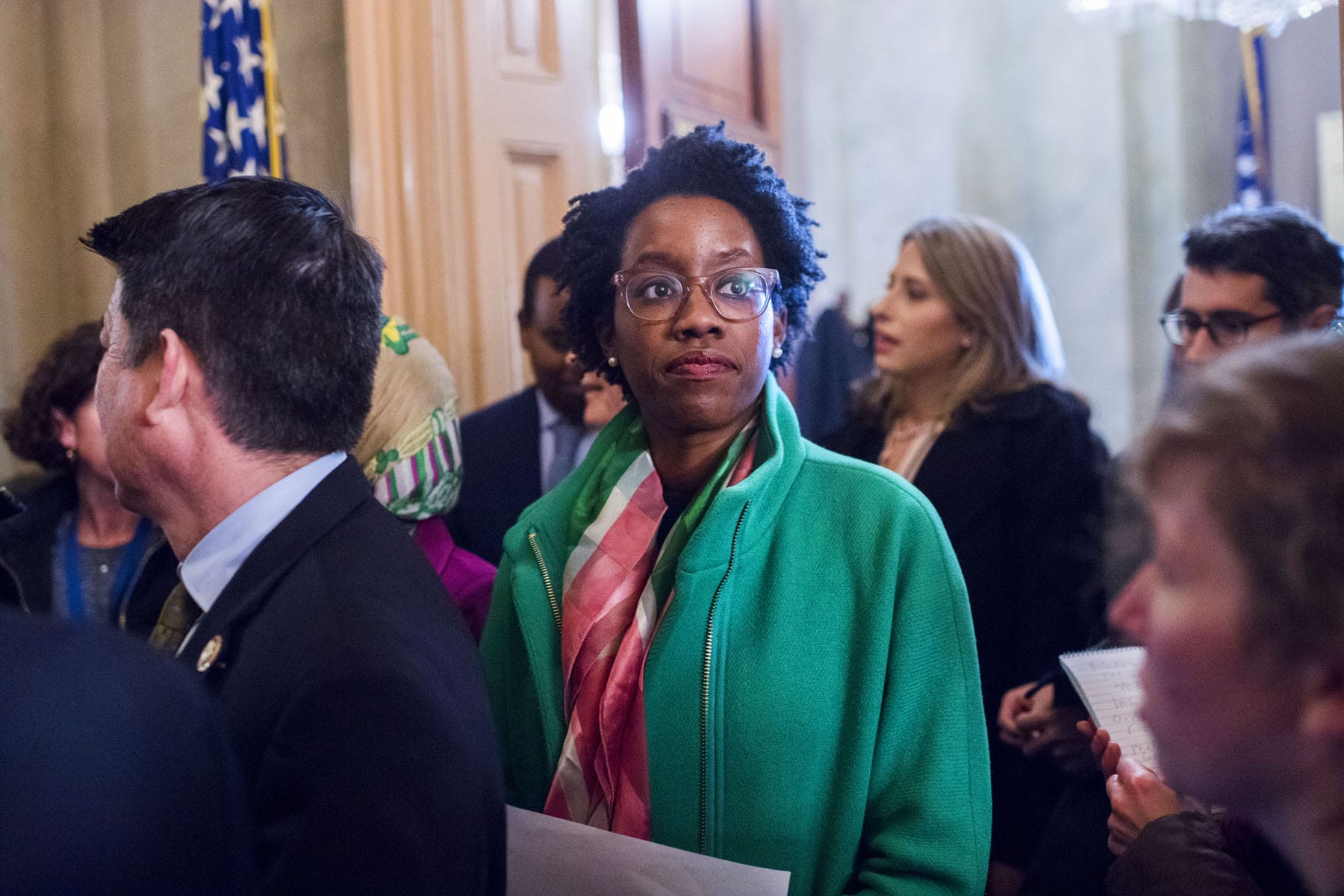Members of Congress on Monday introduced an updated Momnibus Act, taking aim at the nation’s epidemic of pregnancy-related deaths, a crisis that disproportionately affects Black people, and tackles the relationship between pregnancy and COVID-19.
The rate of pregnancy-related deaths in the United States is double that of other wealthy nations, according to the nonprofit Commonwealth Fund. Per government data, Black and American Indian/Alaska Native women are two to three times more likely than White, Latina and Asian-American women to die within a year of childbirth. Disparities between Black and White women exist even when factors like income are accounted for — a finding that researchers say points to deeper concerns of systemic racism in birth-related care.
The updated Momnibus Act, which includes 12 separate bills, would take aim at those gaps, which experts worry have only been amplified because of the coronavirus pandemic. The bill, reintroduced Monday, expands on previous proposed legislation to include measures to tackle the relationship between pregnancy and COVID-19. Pregnant people are more likely to experience complications from the virus, and Black people in particular are more likely to work or live in places that put them at risk of exposure. (They have also been far less likely to receive the nation’s limited vaccines.)
For Illinois Rep. Lauren Underwood, one of the bill’s sponsors, the issue is personal. Underwood, a registered nurse who previously served in the Department of Health and Human Services, wrote her college thesis on the pregnancy crisis. In 2017, one of her own friends — Dr. Shalon Irving, an epidemiologist with the Centers for Disease Control and Prevention and lieutenant commander in the U.S. Public Health Service Commissioned Corps — died soon after giving birth.
Underwood spoke with The 19th about what it will take to address the crisis, the systemic inequities that fuel this disparity, and why lawmakers have struggled for years to address it meaningfully.
This conversation has been edited for length and clarity.
The 19th: Why is it so important that Congress tackle this issue?
Lauren Underwood: This has been a long-standing disparity that has been unacceptable for a long time. This disparity has been around my entire lifetime, and I’m 34 years old.
In 2021, in the United States of America — the richest nation on earth — with all the money we spend on our health care system, we should be able to save our moms’ lives. Period. Nations around the world are seeing a decline in their maternal mortality rate. For ours to be increasing — it is unacceptable.
You said this has bipartisan support. How substantial is the buy-in from Republicans as well as Democrats?
The caucus is bipartisan, the Black Maternal Health Caucus. We have over 100 members, House and Senate, Republican and Democrat. We had the Momnibus last year, which we introduced in March 2020.
We’re reintroducing those nine bills and adding in an additional three. We’ll see who signs on to what, but upon introduction, we know that there’s the Protecting Moms Who Served Act, which I am introducing with Gus Bilirakis from Florida, a Republican. This is to support our women veterans. There’s the Moms Matter Act, which is mental health, behavioral health and substance use prevention. That’s bipartisan.
You have these new bills as well that target how the pandemic has affected the racial disparities in pregnancy-related health. How have we seen the gap widen in the past year? And how do you propose addressing this?
Last spring, there was a piece that came out in the [Morbidity and Mortality Weekly Report] — the CDC scientific publication — outlining the disparities for pregnant people and those in the postpartum period who get COVID. So there are worse maternal outcomes, and it is exacerbated for Black and brown moms. And that is consistent with what we’ve seen all along, but [even more] during a crisis, when we’re seeing limited access to our health care system.
This was during a time when women were advised not to have anybody in the delivery room with them. So you’re taking away that support system. There’s already an issue with trust and communication within that health care system and the provider team and the patient and their family. When you layer on a virus that could yield negative birth outcomes — we knew we needed to act. I teamed up with Sen. Elizabeth Warren, and we introduced the Maternal Health Pandemic Response Act.
This is addressing really some key areas. Number one is, we see that pregnant people are not participating in these vaccine trials. So as a result, there are no recommendations [for how they get vaccinated]. It’s just untenable, and we can fix this.
There’s also similar concern with some of these treatments, that pregnant people are not part of the trials. With COVID-19, only half of states really are reporting their data. And it’s certainly not disaggregated by race, ethnicity, pregnancy status. It’s very hard for us to even know what’s happening if we don’t have access to the data. So our legislation is requiring that type of reporting.
We have one [legislative] title related to vaccines, specifically, the Maternal Vaccination Act, to raise awareness about maternal vaccinations broadly, and increasing vaccination rates.
The third new bill is about climate change. The Journal of the American Medical Association, put out an article talking about the impacts of extreme heat and air pollution on maternal health outcomes. And Black moms have the worst outcomes of all. As soon as I saw the headline, I was like, ‘We need this in the Momnibus.’
The research is really clear that these underlying things have an impact, and you touched on some — there’s climate, there’s housing, incarceration, nutrition.
When we talk about these kinds of long-standing disparities — housing, nutrition, transportation — those are like the building blocks of our Social Determinants for Moms Act that’s in the Momnibus. There’s room to make sure that we are creating a structural environment that is responsive to these long-standing access issues. When we solve them, we will save lives.
The ROI is clear, because it’s been documented in the evidence for decades. And so we’re going to be solving this problem.
Do you think that it makes it easier or harder when we know that the cause in so many ways is these social determinants?
There’s been definite movement over the last, I would say, 20 years. You saw the public health and medical research community really rally around these as key drivers of the equity problems and in the health care space in this country. And we’ve seen now states use their Medicaid programs to help address some of these issues.
But I want to be very clear that race, racism is a factor here, it is not just low-income. Black pregnant people are dying regardless of income and education level at the same rates.
The disparity persists. It’s not like higher-income, higher-educated Black pregnant people have better outcomes. It’s still really bad. I don’t want to suggest that Medicaid intervention is going to solve everything. It’s just if we want to solve a lot, we can engage the Medicaid program.
You talk about the role that implicit bias and structural racism across income, across all these factors, plays. How do we account for that in health care?
We call out implicit bias, which the person legitimately may not be aware of, and you can be educated and coached and held accountable towards behavior change. And there are provisions here in the Momnibus that speak to that.
There’s also explicit bias. Racism, which is prevalent, and it is at a systemic level. We have a provision of the Momnibus called the Perinatal Workforce Act that recognizes that we do need more health care providers of all types of color. And that would allow pregnant people to choose the provider that they want. This is obstetricians, midwives, nurse midwives. It is doulas and lactation consultants. All of these types of providers that often have been left out of the larger health policy conversation are now being centered. And then also with an eye towards diversifying that workforce, and making sure that they are practicing in these medically underserved areas across our country.
How does the history of structural racism play into what we see with the disparity in pregnancy-related deaths?
For so long, this was just accepted so much that it was taught [in the medical field]. Everybody knew that there was something about Black women that they should just be aware of, in a very loose sense. That’s how it was presented to me in my clinical training — something about Black women that there might be more likely to be adverse events during labor, delivery, postpartum.
That is not something that I am willing to accept. Because it’s actually not something about Black women. Actually, there’s something around a racist health care system that doesn’t listen to and respond to and empower people of color. It’s broader than just Black women. And this is a problem that has a solution. This is not inevitable. This is not some kind of genetic factor. This is not something wrong with Black women.
This is about a societal structural issue that we can change in order to save lives. We are in a moment where now we do have this shared commitment to taking action. The politics on all this stuff has changed.
Anecdotally, it has seemed that there is a lot of interest in medical students and people who are in training to become providers to rethink how we teach race and racism and health care. Do you think it is starting to take effect?
It’s definitely taking effect. I mean, we’re seeing in headlines and major publications, not just newspapers or publications like yours, but like People magazine covering a family experiencing a loss and telling these stories, telling the stories of the near misses — icons like Beyonce and Serena Williams telling their stories with severe morbidity.
It is good that we’re seeing members of Congress embrace change. And I am encouraged now that we can take action and pass these bills and get them signed into law.
I was reading some polling earlier this week from the Kaiser Family Foundation. They found that most Americans didn’t know about the racial gap in pregnancy-related outcomes at all.
But guess what? You talk to Black women. I can’t tell you the number of conversations I’ve had in the last two years of women my age coming up to me, and they’re like, ‘As soon as I found out I was expecting, I was terrified.’
Because we know we’re three to four times more likely to die, we know for every death or near miss. We all know somebody, because it’s been our sisters, our girlfriends, our neighbors, our sorority sisters, girl around the block. We’ve all been conditioned to treat it like it was this one-off situation. It was just us. It was just them. They had a bad experience, whatever.
I had a friend who died. It is such a heartbreaking thing to connect women with one another the way that Black and Brown women have been connected by the devastation of severe morbidity and maternal mortality. I mean, honestly. It’s that common.
Given the existence of the Black Maternal Health Caucus, given that we have a vice president who is a Black woman, are we seeing changes in what sort of voices shape our conversation in a way that could shine more light on this issue?
This is the embodiment of why representation matters.
It takes women in these spaces to call out problems that never even got a spot on the agenda, and then to bring together a coalition of folks towards solutions. I think that there’s this assumption among the American people that the Congress works on the most important issues. No, Congress works on the issues that the members raise.
And so if you don’t have people that have the lived experiences of the American people at that table, Congress is not going to be solving or contemplating or exploring all of those problems.
Where do we see things now, with Democrats having a Senate majority, with a president and vice president who did talk about this issue on the campaign trail?
We were so successful in getting maternal mortality worked into the [Democratic National Committee] platform. It was part of Biden’s 2020 presidential campaign platform. We have great support amongst Senate Democrats and a real commitment to solving this issue.
With regard to the Momnibus, have you heard anything from the president and vice president or from Majority Leader Chuck Schumer about making this a priority?
I would say folks are very excited. Everybody knows we’re working on it. And it is clear that this is something that people understand. Let’s talk about the politics on this. Black women are the base of the Democratic Party, the most loyal voting bloc we’ve got. We’re dying, and we have a solution that everybody understands. This is a political winner.
But it’s also a political winner across the aisle. It’s not like people are looking the other way. From a crass political sense, they see that this has political benefits for them, too.
How have things changed for you as someone who studies or understands this issue, or just someone who’s immersed in the discourse?
I first got introduced to this issue through the lens of infant mortality and preterm birth. And there have been some positive improvements. We’ve not solved the problem, but there have been some positive improvements there. Whereas the maternal mortality rate has not improved, it’s gotten worse.
Then after my friend Shalon Irving died, and I made this crazy decision to run for Congress, I knew that I wanted to focus on solving this problem, in particular, because there was just this hole. And there’s so much that we can actually do.
Last year, we had a legislative hearing on one of the bills. It’s moving through the process. We’re getting co-sponsors, all that stuff, this year. I want to be going to signing ceremonies. And I think it’s totally possible.






